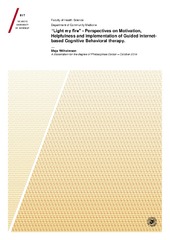| dc.contributor.advisor | Kolstrup, Nils | |
| dc.contributor.author | Wilhelmsen, Maja | |
| dc.date.accessioned | 2015-07-29T08:37:24Z | |
| dc.date.available | 2015-07-29T08:37:24Z | |
| dc.date.issued | 2015-03-13 | |
| dc.description.abstract | Depression is common and imposes tremendous burdens for patients, their family and society. Implementation of internet-based cognitive behavioural therapy (ICBT) within general practice is recommended. Better results have been shown for treatment with ICBT when support is given, and therefore there is interest in exploring guided ICBT as an affordable alternative for treatment in the early stage after the onset of depression. General practitioners (GPs) have shown positive attitudes towards ICBT, although it is currently rarely used in regular care in general practice.
This thesis is based on two studies: a patient study and a GP study. This has resulted in three papers that explore guided ICBT using an online intervention called MoodGYM combined with short module follow-up consultations. This treatment approach was designed to be compatible with general practice in Norway.
The patient study was embedded in a randomized controlled trial that investigated the effects of the programmer on the symptoms of depression. Semi-structured interviews and a phenomenological–hermeneutical approach enabled us to explore in depth how the 14 patients gave meaning to their lived experience from both working with an online intervention and being supported with short consultations in-between the online modules. Paper one explores the patients’ motivation and identifies a sense of relatedness as the most important aspect. The need for relatedness was satisfied if the patient could identify with the online material, achieve feelings of being valued by an important others and feel connected to the therapist. Paper two explored those aspects perceived by patients to be helpful. The findings indicated the importance of MoodGYM as a structured approach to working with the patient’s depression and the patient as an active agent. The patients valued a trusted professional to whom they could self-disclose feelings and from whom they could receive feedback.
In the GP study, GPs were provided with a training package in guided ICBT, and they were asked to implement guided ICBT into regular care. Eleven GPs were interviewed. We used a thematic approach to investigate their experiences. Paper three presents the patterns identified in the interviews. GPs valued ICBT as a structured approach for supplementing their treatment of depression. They also valued ICBT as a tool for enabling patients to become an active agent in their own health care. This was coherent with their role of recommending ICBT, but module follow-ups were difficult. The most important aspects in treatment for depression were to open up for patients and allow them to ventilate their feelings and to sustain a trusting relationship. GPs did not find strategies to combine these human aspects with module follow-ups, and they instead returned to standard treatment.
Overall, the two studies that explored the treatment of depression from the perspective of patients and GPs show that a theory-based online supplement is perceived as positive because it adds structure to the consultation and engages patients. However, it is also important that the therapeutic setting provides patients with the opportunity to self-disclose and ventilate their feelings about their problems and a relationship with the GP built on engagement in the patient as a unique person. I suggest that treatment of depression in general practice would benefit from a flexible approach in which GPs recommend self-help while continuing to use the patients’ stories as a starting point for dialogue. This would benefit both patients and GPs. | en_US |
| dc.description.doctoraltype | ph.d. | en_US |
| dc.description.popularabstract | Det kan gagne depresjonsbehandling i allmennpraksis om pasientene møtes som unike individer kombinert med fleksibel bruk av internett-basert selv-hjelp.
Fleksibel bruk av nettbasert depresjons-behandling kan supplere allmennlegen fordi det gir struktur til konsultasjon og engasjerer pasientene. Det er likevel viktig at det åpnes opp for at pasientene selv kan fortelle fra sitt liv og lufte sine problemer.
Tittel på avhandlingen er; ‘Light my fire’- Perspectives on Motivation, Helpfulness and Implementation on Guided Internet-based Cognitive Behavioral therapy.
Tidligere forskning tyder på at støttet internett-basert kognitiv adferdsterapi (ICBT) kan redusere symptomer på depresjon. Det er lite kunnskap om hvorfor slik behandling i liten grad brukes på allmennlegekontorene og hvorfor mange pasienter ikke fullfører slik behandling. I denne avhandlingen utforskes erfaring med konsultasjonstøttet ICBT gjennom semistrukturerte intervju av 14 pasienter og 11 allmennleger. Undersøkelsene våre identifiserte at en følelse av tilknytning fremmet motivasjon hos pasienten til å fortsette i behandlingen. Behovet for tilknytning ble tilfredsstilt dersom pasienten kunne identifisere seg med nett-programmet, følte seg verdsatt privat og opplevde tillitsfull kontakt i konsultasjonene. Pasientene uttrykte videre at det var til hjelp å tilegne seg relevant kunnskap for å ta tak i sin depresjon og selv være aktiv aktør. De påpekte verdien av å ha en profesjonell de kunne snakke om følelser med, samt få tilbakemeldinger fra. Allmennlegene på sin side verdsatte å kunne anbefale et teoribasert nettprogram som kunne tilføre struktur til behandlingen. Derimot ble konsultasjonsoppfølginger beskrevet som vanskelig av flere grunner; tidsnød, parallelle problemstillinger og frykt for negativ innvirkning på en åpen dialog og på lege-pasient forholdet. Våre funn tyder på at ICBT kan tilføre en positiv struktur og fremme pasientens aktive rolle i depresjonsbehandling. Fokus på tilknytning kan oppleves motiverende. Samtidig tyder funnene på at det er viktig at pasienter kan ventilere fritt om sine problemer.
Maja Wilhelmsen
Institutt for Samfunnsmedisin, Allmennmedisinsk Forskningsenhet
Mobil: 99001559
E-mail: maja.wilhelmsen@uit.no | en_US |
| dc.description.sponsorship | Norsk forskningsråd | en_US |
| dc.identifier.uri | https://hdl.handle.net/10037/7871 | |
| dc.identifier.urn | URN:NBN:no-uit_munin_7458 | |
| dc.language.iso | eng | en_US |
| dc.publisher | UiT The Arctic University of Norway | en_US |
| dc.publisher | UiT Norges arktiske universitet | en_US |
| dc.relation.ispartofseries | ISM skriftserie; 156 | |
| dc.rights.accessRights | openAccess | |
| dc.rights.holder | Copyright 2015 The Author(s) | |
| dc.rights.uri | https://creativecommons.org/licenses/by-nc-sa/3.0 | en_US |
| dc.rights | Attribution-NonCommercial-ShareAlike 3.0 Unported (CC BY-NC-SA 3.0) | en_US |
| dc.subject | primary care | en_US |
| dc.subject | ehealth | en_US |
| dc.subject | depression | en_US |
| dc.subject | cognitive behavioural therapy | en_US |
| dc.subject | telemedicine | en_US |
| dc.subject | mental health | en_US |
| dc.subject | internet | en_US |
| dc.subject | qualitative research | en_US |
| dc.subject | VDP::Medisinske Fag: 700::Helsefag: 800::Samfunnsmedisin, sosialmedisin: 801 | en_US |
| dc.subject | VDP::Medical disciplines: 700::Health sciences: 800::Community medicine, Social medicine: 801 | en_US |
| dc.title | “Light my fire” - Perspectives on Motivation, Helpfulness and Implementation of Guided Internet-based Cognitive Behavioral therapy. | en_US |
| dc.type | Doctoral thesis | en_US |
| dc.type | Doktorgradsavhandling | en_US |


 English
English norsk
norsk





